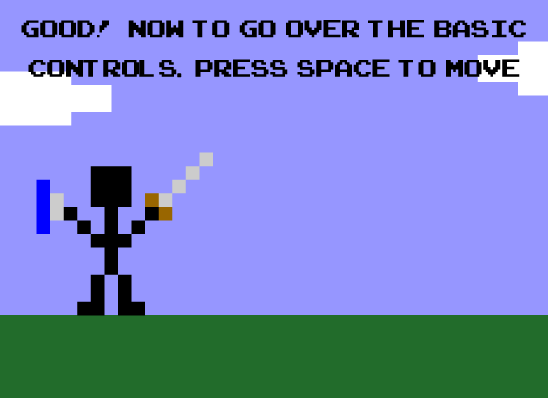This post has not been edited by the GamesBeat staff. Opinions by GamesBeat community writers do not necessarily reflect those of the staff.
In an industry where games are growing larger, and stories are over the top, what happens when we encounter a true art piece? What can a game do to make us question what we do when we play games and why we play them? Super Press Space To Win, a 2009 action RPG, succeeds in forcing players to ask exactly those questions.

Super Press Space To Win is such a simple game that it shouldn't be fun. It's nearly impossible to lose and is so bland and generic that it should be forgettable. Players simply have to press space to move the story along, fight, drink potions, equip spell, retrieve weapons, and use the finishing move. Players have no agency and no choice.
The lack of some gaming conventions and the inclusion of others only showcases how far games haven't come yet. The quick time event which some considered pointless in Battlefield 3 now has a clear point. It doesn't add anything to the game, but it adds a lot to the hypothetical questions raised.
Players are forced to question whether the games played are fun because the games and their mechanics present a challenge to surmount, or because the medium consists of Skinner Boxes and we like being rewarded for pressing buttons. Is pressing the space bar over and over in this game much different than pressing the A button in Final Fantasy XIII? How?
The absolute lack of complexity has made this art piece so generic that it's hard to not see this exact formula in just about every major action RPG on the market.
Just think of a game where the character starts off weak and seemingly insignificant to the story. That character then is thrust, through seemingly fated events, into the middle of the larger situation. Did that character then set out on a quest to get stronger, pick up more weapons and learn new skills? What happened at the end? It might just sound exactly like what happened in this game, or in Dragon Quest.
But yet we see studios like BioWare trying to make more complex action RPGs like Dragon Age: Origins and Mass Effect through choices in story and equipment.
Does the addition of choice or complexity in games change what they are at heart? Do we call interactive pictures or movies 'games' because we have the illusion of choice or victory? Perhaps this additional complexity turns the game from an interactive novel to an interactive pick-your-own-adventure story a la R.L. Stine. The stories and mechanics are pre-written, but what section of the story we see depends on whether we press 1, 2, or 3.
By deconstructing the video game into its most base form the creator forced us to ask many questions of what was just played, and why. The developer's intent may have been to simply parody games, but in doing so opened up an intellectual discussion of creation, appropriation, and even humanity. Does it stop other games that follow this formula from being fun? Absolutely not. Instead, players and developers can use this game for questioning artistic and creative decisions into the future.
This short Flash game is one of those little gems of the internet that absolutely shouldn't be ignored.
